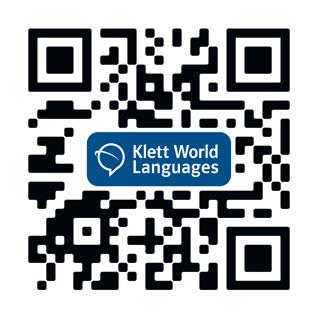A modern, engaging, student-centered German program




A modern, engaging, student-centered German program



KLETT WORLD LANGUAGES is a publishing house specializing in print and digital instructional materials for learning and teaching world languages.
Our mission is to help students become global citizens by developing their intercultural and critical thinking skills through language learning. We aim to help students learn and use language in real-life situations by creating engaging and meaningful content that sparks their curiosity and motivates them to learn.
We strongly believe that teachers play a key role in language learning, and part of our mission is to support them and to provide ample opportunity for professional development.
Having them is not enough. We live by them.
Because everyone on the core KWL team has a background in education and works closely with educators and students, our commitment goes far beyond our daily work. We understand the needs of educators and students and we are passionate about looking for solutions and tools to help them succeed.
We are committed to providing high-quality print and digital content at affordable prices to all who want to learn a language. We guarantee lower prices for high-quality content and simple, easy-to-use technology.
We view languages as tools for communication and action. To learn a language and build authentic communicative competency, students need a realistic context, a true need to communicate, a focus on meaning, and the right linguistic resources. That is what we provide in our educational materials.
Our educational materials focus on the most current pedagogical methodology. They follow the ACTFL Guidelines for Proficiency, include Can-Do statements, and address the 5 Cs. Our digital resources provide original and authentic content via a simple and easy-to-use platform.
We see educators as our partners, and the core of our mission is to support them by providing professional development opportunities, highquality documents and activities, and instructor resources in an easily accessible format.
Our content is created to help students use language to communicate and interact with other communities and cultures both in the United States and abroad. Our books present a respectful, modern, and open-minded perspective of our world and its cultures that allows students to dismantle stereotypes and to cultivate an awareness of global concerns.
PORTFOLIO DEUTSCH NEU is a modern, engaging, student-centered German language program designed to meet the needs of high school students and educators. With its focus on contextual grammar, rich vocabulary, exam preparation, and innovative learning components, the series features a modern layout and delves into teen-relevant topics and texts that resonate with students, ensuring a meaningful and relatable learning experience.

reasons why our workbooks are an effective tool for today's World Language classrooms!
Print workbooks provide a valuable break from screens, fostering tactile learning to boost understanding and retention.
Workbooks aid progress monitoring and targeted support, and empower student review.
Carefully-crafted activities integrate the 5 Cs throughout each unit.
Our print workbooks offer learning flexibility beyond the classroom and internet dependency.
Our print workbooks mirror our communication-focused approach: enhancing skills through activities!
The three modes of communication are integrated into the activities.
1 2 3
( TB 1–2) Schreib die Wörter. Wie heißt die Lösung?
N10
So kommt man auch in die Schule:
( TB 1–2) Schöne Ausreden! Ergänze das passende Verb in der richtigen Form.
ben • den • fah • fah • fin • ge • gen • ha • hen • ken • men • mit • neh • ren • ren • sa • ten • trin • war
Ich konnte nicht mit dem Skateboard fahren (1). Es (2) heute Morgen einen Platten. Deshalb bin ich zu Fuß (3).
Mein Papa hat mich im Auto (4). Aber er ist falsch (5) und hat die Schule nicht (6)!
Ich war wie immer im Bus. Der Busfahrer hat plötzlich (7): „Ich brauche eine Pause.“ Er hat einen Kaffee (8) und wir mussten im Bus (9).
( TB 3) Was sagt Lisa? Ergänze konnte, musste oder wollte.
1. Ich wollte früher da sein, konnte • musste • wollte • wollte Lisa, warum kommst du so spät?
Ich wollte ja pünktlich da sein. Aber ich musste noch mit der Chemie-Lehrerin reden.

aber ich habe meine Uhr vergessen.
2. Meine Freundin hat Probleme. Ich ihr helfen.
3. Ich nicht anrufen.
Mein Handy geht nicht.
4. Der Bus war kaputt, deshalb ich in der Schule warten.
4 musste konnte
( TB 3–4) a Markiere die Formen von können, müssen und wollen.
1. Thomas musste früh aufstehen. Er konnte nicht lange schlafen.
2. Wir wollten am See bleiben und surfen, aber wir mussten wandern.
3. Warum wolltet ihr nicht schwimmen? Das Wasser war sehr warm.
4. Carola, warum konntest du nicht anrufen?
5. Warum konnten Sie nicht pünktlich sein, Herr Fischer? Hatten Sie Probleme?
6. Alex und Tim wollten so gern Skateboard fahren. Aber sie mussten lernen.
7. Carola und Julia, warum konntet ihr nicht mitkommen? Musstet ihr arbeiten?
b Ergänze die Tabelle mit den Präteritum-Formen aus 4a. wollen könnenmüssen wollen könnenmüssen ich wollte konnte musste wir konnten du wolltest musstest ihr er/es/sie wollte konntemusste sie/Sie
5 6
( TB 3–4) können, müssen oder wollen? Ergänze das Modalverb im Präteritum.
1. Pia und Nadja wollten ins Kino gehen. Aber Nadja nicht mitkommen. Sie ihren Bruder Jannik von der Schule abholen.
2. Kolja am Samstag lange schlafen. Aber er nicht im Bett bleiben, er seinen Bruder Denis zum Training bringen.
3. Wir hatten gestern keinen Sport, der Sportlehrer war krank. Wir nach Hause gehen, aber wir in der Schule bleiben.
4. „Warum seid ihr so spät? ihr auf den Bus warten?“ – „Nein, der Bus war schon weg und wir zu Fuß gehen.“
( TB 3–4) Schreib die Sätze im Präteritum in die Tabelle.
1. gestern / wir / ins Kino / wollen / gehen / .
2. Frau Karas / den Bus um 18.45 Uhr / nehmen / müssen / .
3. meine Freunde / mich / zu einer Party / einladen / wollen / .
4. wie lange / du / auf der Party / bleiben / können / ?
Gestern wollten gehen. wir ins Kino
Frau Karas
Position 1 Position 2
Satzende: Infinitiv
7 8
Sequencing: zuerst, danach, ... | saying that you don't understand something
( TB 5–6) Wie heißen die Wörter richtig? Schreib sie mit Artikel.
*NTW*RT die Antwort
P*SSW*RT
M**B*X
M**LPR*GR*MM
N*CHR*CHT
C*MP*T*R
H*ND*
P**ST**NG*NG
( TB 5–6) Falsch verstanden? Hier sind die Verben durcheinander. Finde in den anderen Sätzen das passende Verb. Schreib dann das richtige Verb.
Du hast gesagt, es ist ganz einfach:
Man muss zuerst das Mailprogramm antworten, öffnen und dann Name und Passwort öffnen.
Und dann schreibt man direkt zur Mailbox.
Da kann man dann senden:
Man kann auf eine Mail eingeben oder eine neue Mail kommen.
Und dann muss ich die Mail noch wählen.
Aber das stimmt nicht!
9 10
( TB 6) Was macht Ben nach der Schule? Schreib die Sätze. Ergänze auch zuerst, dann, …
anschließend • danach • dann • zuerst • zum Schluss
1. Ben / das Essen / machen / warm / .
2. am Computer / spielen / er / .
3. machen / die Hausaufgaben / er / . Danach
4. anrufen / er / seinen Freund Tim / .
5. zu Tim / er / gehen / .
( TB 6) Was kann man sagen, wenn man etwas nicht versteht? Markiere in der Wortschlange. Schreib die Sätze.
JIPPDASWARJETZTZUSCHNELLHOPPLICHVERSTEHENICHTOLALAUIBITTENOCHEINMAL HATSCHKANNSTDUDASNOCHMALSAGENMHAHSAGDASBITTENOCHMALLANGSAM KIPPWASHEISSTDASDENNHEHAHIWASMEINSTDUALEADEWIEDERHOLDASBITTERUMPET
Das war jetzt zu schnell.
schnell 11 12 13 14
Eine Nachricht schreiben: Du musst …
( TB 7) Was muss man machen? Schreib Aufforderungen. die App auswählen Wähl die App aus! den Kontakt auswählen den Text eintippen

Im Internet Radio hören: Ihr müsst … die Kopfhörer anschalten

die Nachricht abschicken den Browser öffnen Öffnet den Browser! die Website wählen das Programm anklicken
( TB 9–10) Ein besonderer Tag? Schreib wenn-Sätze als Antworten. wenn ich keine Schule habe. (keine Schule haben)
Für mich ist es ein besonderer Tag, …
(mich frei fühlen)
(mich einfach gut fühlen)
(meine Schwester mir helfen)
(gute Musik hören)
(das Konzert meiner Lieblingsband besuchen)
( TB 9–10) Ein wunderbarer Tag. Was hat Ina erlebt? Ordne zu.
1. F Ina war auf einem Konzert A und sie konnte lange nicht schlafen.
2. Sie kennt alle B bei der Bühne und hat getanzt.
3. Ina war ganz nah C CDs und Videos von ihnen.
4. Nach dem Konzert konnte sie D mit Ina in ihrer Mitte gemacht.
5. Die Band hat ein Foto E mit den Bandmitgliedern sprechen.
6. Ina war so glücklich nach dem Konzert F von ihrer Lieblingsband.
( TB 9–10) Wie kann Musik sein? Wie heißen die Wörter?
Cover credits
All images and texts are protected and licensed for PORTFOLIO DEUTSCH NEU.
© 2023 by Difusión, S.L.
All rights reserved
Would you like to learn more about our K-12 catalog? Please scan the code!

Instagram: klettwl
Twitter: KlettWL
Facebook: KlettWL
YouTube: KlettWorldLanguages
LinkedIn: klettwl
Spotify: Klett World Languages
TikTok: klettwl
Pinterest: klettwl